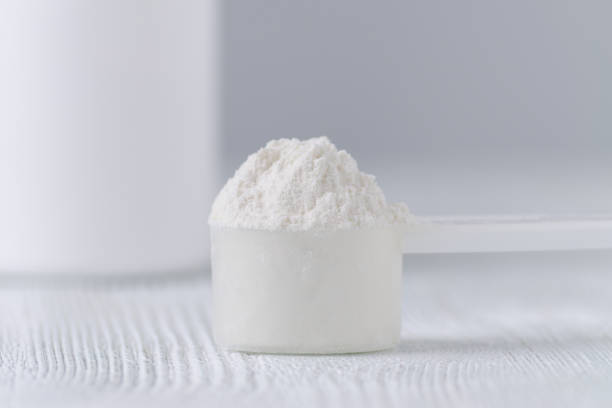Joe Rogan Creatine: What is the Podcast Host's Supplement Routine
Creatine: Joe Rogan's Favorite Supplement for Health and Fitness
Creatine supplementation has become a cornerstone for health and fitness enthusiasts, and it's not just limited to athletes.
Joe Rogan, a renowned podcast host and advocate for a holistic approach to health, is one of its biggest fans. He frequently discusses its benefits for both physical performance and mental clarity.
This article explores why creatine is so popular and why Joe Rogan, along with other fitness experts, swear by its effectiveness.
Whether you're a bodybuilder, an athlete, or just someone looking to boost overall well-being, understanding creatine can be key to improving your fitness and cognitive function.
In this blog post, we'll delve into everything you need to know about creatine, including its benefits, proper dosage, and how it fits into a well-rounded supplement regimen.
If you're wondering whether creatine could be right for you, or if you're looking for ways to enhance your fitness routine, this article is a must-read!
Article Outline
- What Is Creatine and Why Is It Popular?
- What Does Joe Rogan Say About Creatine?
- How Does Creatine Work for Muscle Growth and Strength?
- Can Creatine Improve Mental Performance?
- Understanding Creatine Dosage: How Much Should You Take?
- What Are the Potential Benefits of Creatine for Your Health?
- Should You Include Creatine in Your Supplement Regimen?
- What Are the Different Forms of Creatine Available?
- Can Creatine Improve Your Athletic Performance?
- How to Safely Use Creatine and Maximize Its Effects

What Is Creatine and Why Is It Popular?
Creatine is a naturally occurring compound found in small amounts in foods like meat and fish.
It’s also produced by the body, stored primarily in muscles, and used as an energy source during high-intensity activities like sprinting or weightlifting.
As a supplement, creatine is popular for its ability to boost muscle strength, recovery, and exercise performance.
It is especially popular among athletes and bodybuilders because it enhances the body’s ability to perform at higher intensities, resulting in better workouts, increased muscle mass, and quicker recovery times.
Creatine supplementation has been studied extensively and is well-documented for its effectiveness in enhancing physical performance, particularly for short bursts of energy like those seen in strength training or sprinting.
For more details, check out this creatine supplements ultimate guide.
What Does Joe Rogan Say About Creatine?
Joe Rogan is known for his podcast where he discusses a wide range of topics, including health and fitness. Rogan has often spoken about his personal supplement regimen, and creatine features prominently in his routine.
Rogan typically takes 5 grams of creatine daily, and he believes it contributes significantly to his active lifestyle.
He emphasizes that creatine isn’t just beneficial for bodybuilders—it has cognitive benefits, too.
Rogan is a big advocate for a holistic approach to health, where supplements like creatine are combined with strength training, cardiovascular exercise, and proper nutrition.
He also talks about how taking creatine supports muscle recovery and growth, making it an essential component of his fitness routine.

How Does Creatine Work for Muscle Growth and Strength?
Creatine plays a crucial role in energy production by enhancing ATP (adenosine triphosphate) availability in muscles. ATP is the primary energy carrier in the body, and it’s used during muscle contractions.
When creatine is supplemented, it boosts the amount of stored ATP, providing more energy for short, explosive movements.
This allows for improved performance during high-intensity activities such as weightlifting or sprinting.
By increasing the energy available to muscles, creatine can help improve strength and accelerate muscle growth. It has also been shown to increase the volume of training possible, which can lead to greater overall muscle gains.
As a result, many fitness enthusiasts incorporate creatine into their daily supplement regimen to support muscle strength and endurance.
For further insight, read how creatine works.
Can Creatine Improve Mental Performance?
While creatine is mostly known for its physical benefits, recent studies suggest that it may also have cognitive benefits.
Creatine supplementation has been linked to improved cognitive function, especially in tasks that require short-term memory and quick thinking. Research indicates that creatine can support brain health, particularly during periods of mental fatigue.
Joe Rogan often highlights the cognitive benefits of supplements like creatine and nootropics. He believes that using creatine can contribute to mental clarity, focus, and enhanced brain function.
While creatine is not a magic pill for cognitive enhancement, its ability to support overall mental performance makes it a useful supplement for those who want to stay sharp.

Understanding Creatine Dosage: How Much Should You Take?
When it comes to creatine supplementation, the general recommended dosage is 3-5 grams per day. Starting with a lower dose and gradually increasing the amount can help the body adjust and minimize any potential digestive discomfort.
Some athletes may go through a “loading phase,” where they take 20 grams of creatine per day for 5-7 days, followed by a maintenance dose of 5 grams per day. However, for most people, skipping the loading phase and sticking to 5 grams per day is sufficient.
Joe Rogan typically takes 5 grams of creatine daily as part of his supplement regimen, and he emphasizes that consistency is key. It’s also important to stay well-hydrated when taking creatine, as it can draw water into muscles and potentially lead to dehydration.
For more about dosing strategies, see this creatine monohydrate gummies essential guide.
What Are the Potential Benefits of Creatine for Your Health?
Creatine supplementation has been linked to several potential health benefits beyond muscle growth and performance.
Research suggests that creatine can enhance bone health, support muscle recovery, and potentially reduce the risk of age-related muscle loss in older adults. In addition, creatine may help improve heart health by promoting better cardiovascular function and supporting blood flow.
Although creatine is most commonly used for its benefits in physical performance, it also offers a range of advantages that extend beyond muscle strength. For example, creatine’s ability to support memory and cognitive function makes it a great supplement for overall well-being.

Should You Include Creatine in Your Supplement Regimen?
If you're looking to enhance your fitness routine and support muscle recovery and growth, creatine is a supplement worth considering. It’s been shown to have positive effects on muscle strength, endurance, and exercise performance.
Creatine can also help with post-workout recovery, making it an essential component of many fitness enthusiasts' supplement regimens.
However, as with any supplement, it's important to consult a healthcare professional before adding creatine to your regimen, especially if you have any pre-existing health conditions.
Creatine is generally considered safe for healthy individuals when used in the recommended dosages, but it’s always a good idea to ensure it’s a good fit for your specific needs.
Learn more in our post on creatine supplementation side effects.
What Are the Different Forms of Creatine Available?
Creatine monohydrate remains the gold standard for creatine supplementation, but it’s not the only option available.
There are several different forms of creatine, including creatine ethyl ester, creatine hydrochloride, and creatine malate. Each form has its own benefits, but creatine monohydrate is the most researched and widely used form due to its effectiveness and affordability.
Some individuals may prefer other forms of creatine if they experience digestive discomfort with creatine monohydrate, but for most people, creatine monohydrate offers the best value and results.
If you're unsure about the best form for you, check out creatine HCL vs monohydrate: which is better for your fitness goals.

Can Creatine Improve Your Athletic Performance?
Athletes, particularly those involved in strength training, sprinting, and high-intensity interval training, often turn to creatine to enhance their performance. Creatine has been shown to improve muscle strength, explosive power, and endurance during short bursts of high-intensity exercise.
This makes it a great supplement for athletes looking to take their performance to the next level.
Incorporating creatine into your supplement routine can help you push harder during workouts, which in turn can lead to better results over time. It’s particularly effective for exercises that require quick energy bursts, such as weightlifting or sprinting.
How to Safely Use Creatine and Maximize Its Effects
To safely use creatine and maximize its effects, it’s important to follow proper dosing guidelines.
Start with 3-5 grams per day, and stay well-hydrated to prevent dehydration. Creatine should ideally be taken post-workout or at any time of day, as long as it’s taken consistently.
If you’re new to creatine, you might want to start with a lower dose to ensure your body tolerates it well. Gradually increase the dosage if needed, but always be mindful of how your body responds.
Consulting a healthcare professional is always a good idea if you have any concerns.
For more advice, check out creatine myths.

Key Takeaways
- Creatine is a popular supplement known for its ability to boost muscle strength and enhance exercise performance.
- Joe Rogan is a strong advocate for creatine, taking 5 grams daily as part of his holistic approach to health.
- Creatine enhances muscle recovery, increases energy during workouts, and may have cognitive benefits.
- A typical creatine dosage is 3-5 grams per day, with the option to start with a lower dose and gradually increase.
- Creatine is generally safe for healthy individuals when taken in the recommended amounts, but it’s important to stay hydrated.
- The gold standard of creatine is monohydrate, though other forms are available depending on individual needs.
- Incorporating creatine into your fitness regimen can help improve athletic performance and muscle growth.
With the right approach and consistent use, creatine can be a valuable addition to your supplement routine, whether you're aiming for physical performance, cognitive function, or overall health.
For More Training Advice + Diet and Lifestyle visit us Combat Creatine
PS: Make sure you check out the rest of our Training Guides:
Creatine
- Creatine Supplements Ultimate Guide
- Creatine Monohydrate Gummies
- Creatine Powder Vs. Pills
- Creatine HCL vs Monohydrate
- How Does Creatine Work
- Does Creatine Make You Poop?
- Does Creatine Break a Fast
- A Guide to Supplement Forms
- Creatine Supplementation Side Effects
- Creatine Myths
- Creatine Pros & Cons
- Creatine Monohydrate Powder
- Creatine Recovery
- Creatine Loading Phase
- Women Should Take Creatine
- Creatine Kinase
- Best Creatine Monohydrate Gummies Review: Top 10 Best Creatine Gummies












